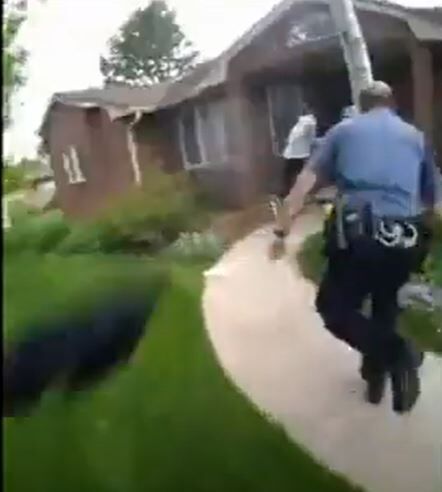Federal judge rejects immunity for Colorado Springs officers in suit over man’s death

According to Colorado Springs, its officers acted reasonably during the hot pursuit of a felon. They applied minimal force to the resisting suspect and immediately changed course when they realized he might have stopped breathing.
Lawyers for the now-deceased man, however, alleged the police had “preyed on” his mental disability, tasing him while he was unarmed and speculating he was “playing possum” when he was actually dying on the floor of his home.
On Friday, a federal judge ruled Chad Alexander Burnett’s estate had plausibly claimed four officers and the city had violated his constitutional rights with their actions and were not immune from being sued. Represented by Burnett’s aunt, the estate alleges the individual officers used excessive force, unlawfully entered Burnett’s home without a warrant and failed to provide medical care.
“The Officers acknowledged that they could not see physical signs that Burnett was breathing,” wrote U.S. District Court Judge William J. Martínez in a July 22 order. “It does not take a medical degree to recognize that someone who is not breathing requires a doctor’s attention.”
Burnett, who was 49 at the time of his death, had struggled with depression and mental illness since he was a teenager, according to the estate’s lawsuit. On the morning of May 24, 2020, two of Burnett’s neighbors called 911 to report Burnett was on the street with a knife, in one instance threatening a person.
Officers Joseph Daigle and Matthew Fleming arrived at Burnett’s home in the 2700 block of Ashgrove Street around 10 a.m. Standing outside Burnett’s closed door, they attempted to coax or order Burnett to exit his home. Also on the scene was Sgt. Michael Inazu, who the lawsuit alleged was familiar with Burnett’s mental illness.
For approximately 90 minutes, the officers were unsuccessful at getting Burnett to come outside. According to body-worn camera footage, Burnett’s lawyers wrote, Inazu told the others he “would love to say we have some sort of hot pursuit … but I think because of the time we’ve been here, the courts would not look too happily upon that.”
He added, “We’re probably going to need to get a warrant to go in there and grab him if he doesn’t fall prey to one of our tricks.”
While police waited and spoke with neighbors, Burnett threw books, clothes and a knife into his yard. At one point, he called 911, identifying himself as “Chazar Borchert” and saying he “own(ed) the Broadmoor” hotel. (Colorado Politics’ parent company, The Anschutz Corporation, is the owner of the Broadmoor.)
The officers eventually charged at Burnett while he was standing just outside his door. Burnett retreated inside and attempted to slam the front door, but Inazu, Fleming and Daigle entered and immediately attempted to subdue him. Officer Caroline Barth followed and quickly tased Burnett.
“Kill me now,” Burnett said, as Barth tased him two more times.
Burnett continued to struggle and ordered the officers out of his home. Police got him as far as the front doorway before he fell back inside.
“I told you to relax, didn’t I?” yelled Daigle, according to the body-worn camera footage.
After struggling for a few more moments, Burnett ceased and lay face down on the floor. For the next several minutes, officers intermittently observed Burnett seemed to have a pulse. Otherwise, they put a “spit sock” over his head, laughed about their entry into his home and claimed Burnett was “playing possum” while he remained unresponsive.
“We’re sorry this happened, but you have to listen to the police,” Inazu told a motionless Burnett.
The lawsuit alleged officers waited eight minutes after Burnett had stopped breathing before attempting to resuscitate him. He died around noon, and the coroner would subsequently rule his death a homicide. The Fourth Judicial District Attorney’s Office declined to prosecute the officers, citing the “ongoing, unpredictable threat” Burnett allegedly posed.
One year later, Burnett’s estate filed a federal civil lawsuit against the officers and Colorado Springs.
“Mr. Burnett’s death was wholly avoidable. If officers had acted appropriately, within the bounds of the law, he would still be alive today,” the lawsuit reads. “Instead, officers unlawfully entered his home, employed force far in excess of what was necessary or constitutionally permitted, and then consciously disregarded clear signs of a medical emergency, standing by as Mr. Burnett, limp and unconscious, died on his living room floor.”
The defendants moved to dismiss the lawsuit, contending the officers reacted reasonably in balancing Burnett’s safety with that of his neighbors. The officers asserted qualified immunity, which shields government workers from civil liability unless they violate a person’s clearly-established legal rights.
The city submitted the officers’ body-worn camera videos and claimed the footage “blatantly contradicted” the plaintiff’s allegations.
“Not only had Mr. Burnett, one, refused to surrender in the preceding hour and a half and, two, sprinted into the house and attempted to slam the door on officers when they chased after him, he also refused a lawful order to place himself on the ground,” wrote W. Erik Lamphere with the Colorado Springs City Attorney’s Office.
Lamphere added officers were “in hot pursuit of a felon,” applied “minimal force” and “immediately recognized that something had changed” when Burnett ceased breathing. Although Burnett’s estate did not ask Martínez to consider the body-worn camera footage in weighing whether to dismiss the lawsuit, it quoted Inazu’s comments about Burnett falling “prey to one of our tricks” in support of the lawsuit’s allegations.
Martínez agreed the officers had probable cause to believe Burnett committed a felony by menacing his neighbor with a knife. However, the judge also believed the estate plausibly claimed the officers unconstitutionally entered Burnett’s home without a warrant, rejecting the officers’ defense that they were in “hot pursuit” and did not need a warrant.
Martínez further explained that while the officers could prevail in the lawsuit if they used force in response to Burnett’s resistance, the allegations suggested their efforts to subdue Burnett were unreasonable.
“The reasonableness of the Officers’ force is especially suspect,” Martínez added, “if whatever resistance Burnett offered was provoked by the Officers’ deliberate decision to trick Burnett into leaving his home to circumvent the warrant requirement.”
The judge also denied qualified immunity to the officers on the estate’s medical claim, ruling it was clearly established that a failure to check breathing, perform CPR or seek medical care was a violation of Burnett’s rights. The city could likewise be held liable for a failure to train its officers and for an alleged custom of similar civil rights violations.
Martínez did, however, dismiss the estate’s claim that officers violated Burnett’s rights under the Americans with Disabilities Act by failing to accommodate his mental illness.
Felipe Bohnet-Gomez, an attorney for the estate, said he was pleased the judge viewed the allegations of unconstitutional conduct in the lawsuit as sufficient.
“He did needlessly die as a result of the officers’ conduct, and we look forward to presenting our case to a jury and obtaining some measure of justice for Mr. Burnett’s family,” Bohnet-Gomez said.
The lawyer for the defendants did not immediately respond to a request for comment.
The case is Estate of Chad Alexander Burnett v. City of Colorado Springs et al.













